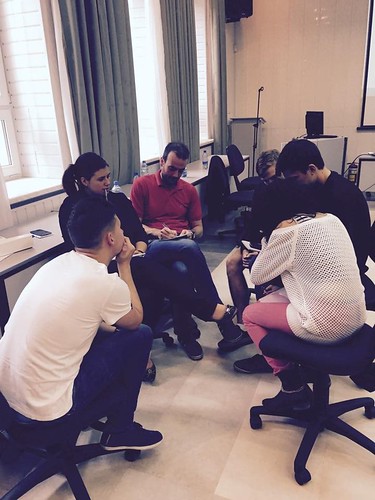Photo Album
 (In case of the photo album not working, please follow)
(In case of the photo album not working, please follow) Venue:
Национальный Банк Республики Беларусь
Exploring the Potential of Social Media
-
Youth unemployment is now one of the greatest challenges facing all EU countries. Unemployment hurts at any age; but for young people, long-term unemployment has more negative effect. It means lower earnings, more unemployment, more ill health later in life.
- • There are too many people chasing for few vacancies.
- • There are many well qualified people looking for job.
- • Rejection can be demotivating and depressing factor that affect future job hunting.
- • Normal methods can make young people feel they have no control or influence over their life.
- • Increase the level of awareness and key competences of youth workers in social media area.
- • Increase competences, linked to professional profiles of the participants.
- • Increased ability of youth workers and quality of projects within their organisations to address the needs of the disadvantaged young people they are working with.
It means more inequality between rich and poor – because the pain hits the most disadvantaged.
New analysis from the Local Government Association (LGA) has revealed that of the 2.5 million young people struggling to find enough work across England and Wales, only 340,000 are likely to find more work over the next four years, leaving 2.12 million still unemployed or underemployed.
Third of young people trapped in underemployment by 2018, warns LGA.
The situation is even worse in other EU countries.
Taking into account the current rate of unemployment, and the fact that job market is very competitive at the present, there is a need to adapt job-hunting methods to the current situation.
The problem faced by many job seekers – especially during times of economic hardship – are also the reason that usual job seeking methods don’t work well:
To be successful in job hunting and make some career progress, young people can use their skills in social media which is now an integral part of many young people's lives.
In fact, the latest research from Ofcom suggest that almost half of young people aged between 8 and 17 have a profile on a social networking site such as Facebook.
Young people are remarkably comfortable with technology, and there is a need how they can make the most of social media and networking to spark some creativity into their career progress.
Social media can help young people to develop public ways of presenting themselves, their skills and knowledge.
Youth workers can play important role to help their target group to progress into employment using social media more effectively.
This project focused on social media as a way to boost career progress or finding a job.
The target group is youth workers who planned to cascade their knowledge and implement activity for their target groups to find effective way of accessing new ideas, innovative approaches and new skills to tackle youth unemployment.
The training course 'Exploring the potential of social media' addresses the issue of youth unemployment and the need to increase chances of young people to find a job.
The training focused on use of media platforms to help young people into work.
The participants increased their interpersonal, intercultural and foreign language skills.
Increased level of awareness and competences in social media will have impact on professional and personal development.
The participant have been equipped with practical knowledge how to use social media to enhance employability and be more successful in job hunting.
This competences empowered the youth workers to implement diverse and attractive projects to address the needs of their target group to tackle youth unemployment issues.
The objectives of the project are:
The project will add additional value and innovations to the participants’ previous work and to the organisations they represent.
The training course will offer space for interactions of participants working in different settings, sharing of ideas and creation of a platform for future international projects.














